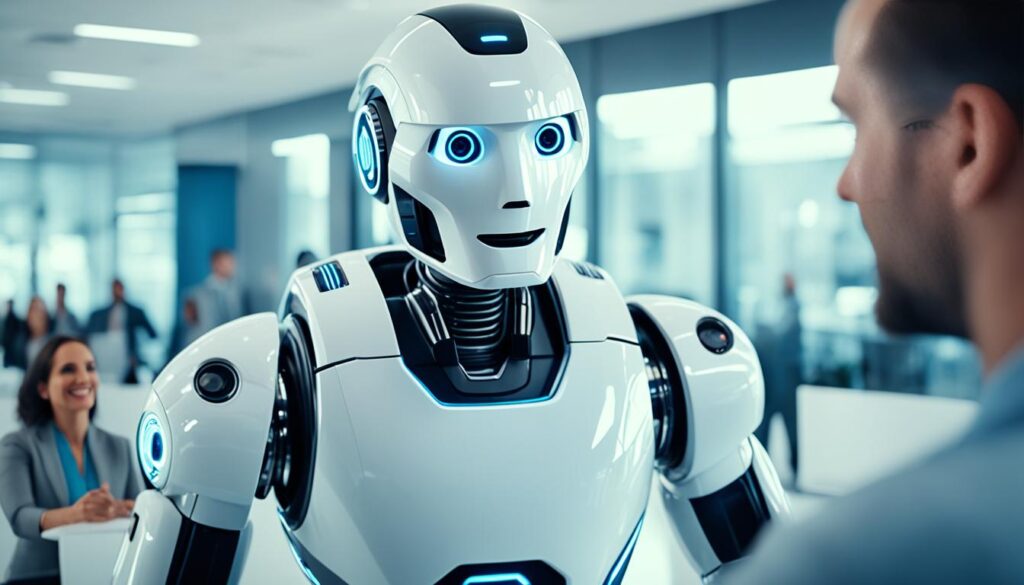“Artificial intelligence is the future, and the future is now.” – Dave Waters
In our fast-moving digital age, using Artificial Intelligence (AI) in marketing is essential. A recent study shows that 85% of marketers had to learn new skills because of AI. This change shows AI’s huge impact on marketing automation, changing the way we handle customer relationships and campaigns.
AI teaches machines to think and make decisions like humans. Tools such as Optimove lead this change. They offer AI-powered marketing campaign orchestration. This shift allows us to move from simple rule-following to complex, tailored customer interactions. It shows the endless possibilities of AI in making marketing more efficient and impactful.
By adding AI to our marketing toolkit, we can manage tasks over various channels like email and social media better. We can excel in making content suited to each customer and understand campaign data more deeply. This makes our marketing efforts more smooth and powerful, from planning to execution.
Key Takeaways
- AI transformative impact on marketing automation elevates efficiency and effectiveness.
- AI is reshaping the marketing landscape by facilitating sophisticated, personalized interactions.
- Tools like Optimove illustrate the power of multichannel, AI-based orchestration.
- AI helps automate tasks across channels, resulting in adaptive and customer-centric campaigns.
- Advanced AI applications enhance personalization and analytics in marketing strategies.
Understanding AI and Its Role in Marketing
Today’s digital world is changing fast, and artificial intelligence plays a big role in marketing. AI includes machine learning and can do tasks that need human smarts. This includes making choices, understanding language, and analyzing data. Meanwhile, automation uses tech to do set tasks with little help from humans. Using AI in marketing is changing the game for marketers.
Defining AI and Automation
AI and automation are linked but they do different things in marketing. AI goes beyond automation by letting machines learn, adapt, and decide based on huge data amounts. This makes marketing more efficient and personal. Nowadays, 85% of marketers are learning about AI. This shows how important it is becoming.
History and Evolution of AI in Marketing
The story of AI in marketing is fascinating. Before, marketing was mostly done by hand, taking a lot of time and effort. But AI brought speed and efficiency. Now, AI chatbots give instant help to customers. And AI helps suggest products that customers might like. This makes shoppers more interested and engaged.
Predictive analytics is another big change. It guesses what customers will do next by looking at past actions. This seems like magic compared to a few years ago. Also, AI is great at sorting through lots of data. This helps with making ads that work better and saving money.
AI is now used to write content too. About 42% of companies use it for this. And 70% think tools like ChatGPT will make making content even faster. These numbers show how crucial AI is in making marketing smart and tailored to each person.
Experts from Gartner and Forbes think AI in marketing will only get smarter and more focused on data. This puts businesses who use AI ahead of the rest. It means more success, better connections with customers, and more profits.
Why AI is Perfect for Marketing Automation
The role of artificial intelligence (AI) in marketing automation has grown immensely. It not only manages more campaigns but also creates personalized experiences for customers on the spot. This move to AI-driven marketing automation boosts efficiency and scalability. It helps in engaging customers better and achieving higher returns on investments (ROI).
The Shift from Traditional to AI-Driven Automation
Old-school marketing automation relied on manual rules. Marketers had to define everything by hand. But now, AI has changed the game in marketing automation. It uses real-time data and makes decisions on its own, cutting down manual work. AI quickly adapts to customer behavior and likes, making campaigns more personal and powerful. For example, Optimove’s CRM Marketing Platform leverages AI for managing marketing across multiple channels effortlessly.

Scalability and Efficiency Gains
One big plus of AI in marketing automation is its scalability. AI can handle and fine-tune vast customer campaigns all by itself, perfect for expanding businesses. It also streamlines tasks like analyzing data, qualifying leads, and planning emails, saving time. Email automation, powered by AI, schedules emails based on when customers are most likely to engage, boosting open and conversion rates. AI also refines ad placement and budgeting continuously to maximize ROI.
AI takes over complicated tasks, letting marketers aim for bigger goals. This not only increases productivity but also makes marketing campaigns more efficient and lively.
| Traditional Marketing Automation | AI-Driven Marketing Automation |
|---|---|
| Manual rule-based workflows | Real-time data processing and autonomous decision-making |
| Static customer journeys | Adaptive and personalized customer journeys |
| Limited campaign scalability | Effortless scalability |
| Time-consuming data analysis | Automated data analysis and insights |
Benefits of AI in Marketing Automation
Artificial intelligence boosts marketing in many ways. A key advantage is better customer engagement. AI uses data to create personal interactions and recommendations. This builds stronger customer ties and loyalty. As a result, companies see higher sales because messages connect more deeply with people.
Enhanced Customer Engagement
AI makes customer engagement smarter. It uses predictive analysis to offer personal touches. Customers get messages and product tips that meet their needs. This makes them feel understood. AI chatbots offer help any time, improving customer happiness.

Cost Reduction and Resource Optimization
AI tools in marketing save money and make better use of resources. They find and fix weak campaigns, improving returns. AI handles a lot of data, giving insights for smart choices.
Improved Personalization and Customer Experience
AI also makes marketing more personal and improves the customer journey. It uses smart tech to guess customer needs from past and current data. This means every message and campaign fits the customer perfectly, boosting engagement and happiness.
| AI Marketing Automation Benefits | Description |
|---|---|
| Enhanced Customer Engagement | AI algorithms use data to deliver personalized interactions, leading to increased loyalty and conversion rates. |
| Cost Reduction | AI identifies inefficient campaigns, reallocating resources for improved ROI. |
| Resource Optimization | Efficient data management and valuable insights aid in making informed decisions. |
| Improved Personalization | Predictive analytics ensure tailored messages, enhancing customer experience. |
| Customer Experience | AI-driven personalization models foster better customer connections. |
In short, AI transforms marketing automation for the better. It brings closer customer connections, more savings, and tailored marketing. By tapping into AI for customer engagement and smarter resource use, companies can boost their marketing power.
AI-Driven Marketing Automation: Key Applications
AI-driven marketing automation is changing the way we understand and interact with customers. It uses deep insights and automates hard processes. We’ll look at how AI is having a big impact in several key areas.
AI in Analytics for Marketing Insights
In AI in analytics, Artificial Intelligence is crucial. It looks through lots of customer data to find helpful insights. Recent studies show 42% of companies use AI to make better content. This is expected to grow as 70% of marketers see its value in making creative work faster. Forbes notes AI tools like ChatGPT can quickly make content. This lets marketers plan and improve their campaigns more effectively.
AI also scores leads by analyzing data. It finds and ranks prospects most likely to make a purchase. This helps us focus on the most valuable customers. With so much data out there, AI in analytics is key to making our marketing strategies smarter and based on solid insights.
AI in Campaign Creation and Orchestration
AI-driven marketing automation shines in campaign creation and orchestration. It helps find customer segments and suggests content just for them. This means we can send the right messages at the perfect time.
Using AI gives a big boost in how we plan and run customized marketing. It picks and runs personalized marketing moves automatically. This brings messages closer to the customer, raising engagement. Being precise and personalized is important for connecting with customers deeply.
| Applications of AI in Marketing | Impact |
|---|---|
| AI in Analytics for Marketing Insights | Provides deep insights by analyzing customer data, enhances content creation, and improves lead scoring. |
| AI in Campaign Orchestration | Facilitates dynamic customer segmentation, recommends content, and automates personalized marketing actions. |

AI does more than just analyze data and make campaigns. It also improves how these campaigns reach people through many ways. By using AI in analytics and campaign orchestration, marketers achieve unprecedented personalization and efficiency.
How AI Improves Marketing Automation
In the world of marketing, it’s key to know how AI boosts automation. AI quickly processes data, letting companies make fast decisions for their campaigns. With AI, marketing becomes more timely and focused on the right targets.
Real-Time Data Processing and Decision Making
AI’s big win in marketing automation is its quick data handling. This lets marketers tweak strategies right away with the latest insights. For example, AI examines customer behavior to suggest the best messages or deals. This means marketing efforts become more agile and suited to what customers want.
Personalized Customer Journeys and Messaging
AI shines in creating personalized customer experiences. It looks at data all the time to tailor messages for each person’s likes and actions. This not only draws in more customers but also lifts sales. Plus, AI predicts future trends, keeping marketing fresh and relevant.
Let’s look at some key data about AI’s role in marketing automation:
| Key Statistics | Impact on Marketing Automation |
|---|---|
| 85% of marketers are updating their skills due to AI revolutionizing the marketing scene. | Shows the widespread influence and necessity of AI in modern marketing. |
| 42% of businesses are already using AI to create written content. | Highlights the role of AI in content creation and efficiency. |
| 70% of businesses believe that ChatGPT will aid in fast content creation. | Indicates the growing reliance on AI tools like ChatGPT for quick, effective content generation. |
| AI can boost email marketing campaigns by improving open rates, click-through rates, and conversion rates. | Emphasizes AI’s ability to enhance key performance metrics in email marketing. |
| Companies implementing AI in marketing automation gain a significant competitive advantage. | Reaffirms the strategic importance of AI for maintaining a competitive edge. |
| AI enables predictive analytics, allowing marketers to anticipate future trends and customer behaviors accurately. | Underscores the role of AI in forward-thinking marketing strategies. |
Leveraging AI for Marketing Automation Success
Today, using AI in marketing is a must for quick progress. 85% of marketers say they’ve had to learn new skills because of AI. AI is not just a passing fancy. It’s crucial for successful marketing. Discover some top AI marketing strategies and what mistakes to dodge.
Best Practices for Implementing AI in Marketing
For the best results with AI in marketing, here are key practices to adopt:
- Set Clear Goals: Make sure your AI strategies have clear, measurable targets that match your business aims.
- Ensure Data Quality: Good AI results need top-notch data. Keep your data fresh and clean to improve AI’s work.
- Select the Right Tools: Pick AI tools that fit your needs and are known for success in marketing. Tools like ChatGPT are popular because 70% of companies think they speed up creating content.
Common Pitfalls and How to Avoid Them
AI in marketing brings big benefits but also some risks:
- Data Bias: AI can pick up biases from old data. Regular checks and using a variety of data can help avoid this.
- Lack of Human Oversight: AI is there to help, not to replace human insight. Make sure people are still making the big decisions.
- Overlooking Personalization: Using AI to customize customer experiences can boost engagement and sales. Personalize your messages for better results.
Knowing these AI marketing tips and avoiding the traps can help your business. It lets you fully use AI, refining your marketing for the best outcome.
The Power of AI in Marketing Campaigns
Artificial Intelligence (AI) is changing the way we do marketing. It helps create more effective campaigns by understanding large amounts of data. This lets marketers adjust their content and plans to match what people like.
AI-Driven Content Recommendations
AI makes it easy to find content that will interest people. With tools like natural language processing, AI can suggest content that appeals to target audiences. Today, 42% of businesses use AI for writing, and 70% think tools like ChatGPT will make it even easier.
- 85% of marketers are learning new skills because of AI’s impact.
- AI helps find content that people want to see, making them more engaged.
Dynamic Audience Segmentation with AI
AI is also great at dividing audiences into smaller groups for more personalized marketing. Dynamic audience segmentation with AI lets companies target very specific groups. This can lead to more people getting interested and buying things.
Let’s look at how AI-driven segmentation impacts marketing:
| Metric | Impact |
|---|---|
| Open Rates | Increased by up to 20% |
| Click-Through Rates | Enhanced by up to 15% |
| Conversion Rates | Boosted by up to 10% |
AI helps get more people to visit stores by 80% with its smart strategies. It personalizes marketing on the fly, giving businesses an edge. AI chooses where ads should go and scores leads, focusing on those most likely to buy.
AI does more than just the basics in marketing. It’s changing how we reach customers, use our resources, and get better results. As we use more AI, our marketing will only get sharper and more effective.
Enhancing Marketing Automation with Artificial Intelligence
Artificial intelligence (AI) is changing marketing automation in big ways. It’s making lead scoring and customer support better. With AI, businesses can look closely at lots of data to find and rank leads accurately.
AI for Lead Scoring and Qualification
AI is really changing how companies score leads. Before, scoring leads took a lot of work and sometimes wasn’t accurate. But now, AI uses data to better judge leads. This helps marketers focus on the most promising leads. It makes the sales process smoother.
“AI can automate lead scoring and qualification, enabling marketers to focus on the most promising opportunities and drive revenue growth.”
Automated Customer Support with AI Chatbots
AI is also improving customer support with chatbots. These AI chatbots give fast, personalized answers 24/7. They can do everything from simple questions to complex problems. This frees up people to work on bigger things. It makes customers happier and doesn’t cost much to scale up support.
- 85% of marketers are prompted to update their skills due to AI’s impact.
- 42% of businesses are already using AI for creating written content.
AI in marketing doesn’t stop at scoring leads or using chatbots. It also helps with email marketing, suggesting content, and targeting ads better. By using AI well, businesses can stay ahead, quickly adjust to changes, and meet customer needs.
| Statistic | Insight |
|---|---|
| 70% considering ChatGPT for fast content creation | AI-driven content generation is increasingly popular. |
| AI enhances email marketing campaigns | Improved open, click-through, and conversion rates. |
| Combining AI with marketing automation | Enables advanced orchestration and personalization. |
Case Study: Successful AI Marketing Automation Implementations
Today’s marketing world changes fast. AI-driven automation is key for growth and better operations. By looking at real examples, we learn how AI can improve marketing. It changes how we engage with customers, convert sales, and understand their needs.
Real-World Examples of AI-Driven Automation
Many businesses now use AI in marketing, seeing big improvements. For example, AI helps create content that increases email opens and clicks. It also lowers spam complaints. AI analyzes data to improve ad targeting, boosting ROI and performance. We found that 42% of businesses use AI for making content. Also, 70% say AI like ChatGPT makes content creation quicker.
Outcomes and Lessons Learned
AI does more than just help create content. It uses predictive analytics to foresee customer behavior, like churn rates. AI personalizes suggestions, making customer interaction better and raising sales. With 80% of experts using AI, it’s clear. AI allows for better audience targeting and personal experiences.
Looking at successful case studies shows us AI’s flexibility. These stories highlight the need to match AI use to each business’s needs. Using AI in marketing helps create strategies that really speak to customers. This leads to better engagement and more sales.



